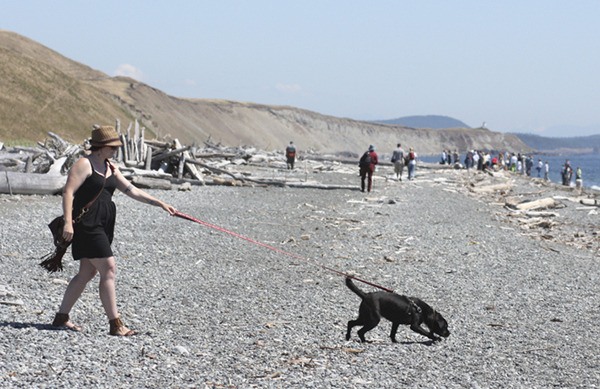In April, Karl Mueller took a walk on Redoubt Road at American Camp, where foxes are seen in the high grass, deer graze and eagles soar overhead.
On this day, a few other animals could be spotted — Mueller’s three dogs, two on a leash and one terrier, Buster, off a leash. During Mueller’s walk, Chief Ranger Barry Lewis pulled up in his car and by the time the two men parted ways, Mueller found himself barefoot and handcuffed with a court date for interfering with a federal agent and disobeying a lawful order.
“He was acting like he was arresting gangster John Dillinger,” Mueller would later say. “I thought it was a joke.”
The San Juan Island National Historical Park was founded on peace, after British troops left the island in 1872 without a single shot fired in anger, but recent enforcement of park laws has sparked controversy in the community.
According to those accused of breaking these laws, which include leash laws and parking violations, it’s not so much that — but how laws are enforced.
From the fall of 2009 to the winter of 2011, the position of chief ranger at the national park was vacant. In the absence of a ranger, specific park laws were enforced by the county deputy.
Every year seasonal rangers, who also serve as law enforcement officers, enforce park laws, but according to Mike Vouri, acting superintendent of the national park, this is the first time in 16 years he has seen anyone arrested in the park by a ranger.
“I want to make it clear, we’re not in the business of arresting people,” Vouri said. “We’re in the business of
preserving and protecting nature and history, and engaging the public.”
Dogs on leash
Mueller recalls Lewis explaining that all 400 national parks have the same leash laws. Parks like Grand Canyon and Yellowstone, even prohibit pets, leashed or not.
Mueller was insulted by the ranger’s “lecture” and picked up Buster before telling Lewis, “I hope you have a good day because you’ve ruined mine.”
According to Mueller, Lewis followed him in his car and when Mueller was about 20 feet from his car, Lewis said, “Freeze, do not move.”
When Mueller turned to face Lewis, he saw the ranger’s hand resting on his gun.
After calling Sheriff Rob Nou to the scene, Lewis began writing a ticket for an unleashed dog.
During this time, Mueller admits to remarking, “I gotta tell you, I’m glad you’re not my doctor because your bedside manner sucks.”
The ranger asked for Mueller’s Social Security number, which Mueller initially refused to give because he believed Lewis had this information on his computer monitor inside his vehicle. After some discussion, Mueller rapidly fired off the numbers and Lewis cuffed him and removed his shoes. Mueller was taken to the sheriff’s office and issued several tickets.
Vouri declined to comment on the specifics of the case as it is ongoing.
“If someone refuses to give information for a ticket, the ranger can make an arrest,” Vouri said. “We are mandated to make an arrest.”
Asked about park law enforcement, Ranger Lewis declined to comment for this article.
Mueller has already spent $4,000 in legal fees, he says. His plea hearing occurs on Aug. 9 and he’ll plead not guilty.
“The ticket could have been put in the mail,” Mueller said.
Mopeds in the bathroom
Adam Davies, of Shoreline, Wash., and Meryn Robinson, of Seattle, admit they did the wrong thing.
On a summer day, they rented mopeds and visited American Camp. Upon reaching the parking lot, they parked on the hash marks beside a handicapped spot.
“We wanted to save the parking spots for other cars,” Davies said.
They visited the beach for a few hours. When they returned the mopeds were gone.
An American Camp park employee notified them that the mopeds were “impounded” because they were parked illegally. Lewis arrived on the scene and after roughly 25 minutes, the ranger issued two $250 tickets.
Davies described the ranger as friendly, but found it odd that the mopeds were “impounded” in the nearby restroom.
Vouri said park policy allows illegally parked vehicles to be impounded.
“We shouldn’t have parked there,” Davies said. “But the friendliest thing would have been to move the mopeds to a parking spot and leave a ticket.”
By the time the two visitors returned to Susie’s Mopeds, they had missed their 6:30 p.m. ferry. The owner of the mopeds waived their late fees and the two visitors waited for the next ferry, arriving at 10 p.m.
A week later they both were notified that the tickets were reduced to $100.
Adding to the controversy, surveillance cameras were installed about six months ago at the park. According to Vouri, the cameras were placed in response to several incidents of vandalism, including the apparent theft of a leash law sign at Jackle’s Lagoon and the dumping of trash at a dinghy dock at English Camp.
“Now I find myself looking over my shoulder, feeling like I’m being watched,” said Susan Matthews.
In a letter to the editor, (see July 13, Journal edition) Matthews wrote that she felt unwelcome by cameras recording her movements through the park.
“People are welcome at the parks,” Vouri said. “There is no reason to be threatened or intimidated at the park.”
All national parks have gateway communities, and Vouri said there’s always a challenge of communicating and educating islanders.
“Even with signs, bulletins and notices there seems to be a lack of information,” he said.
When concerned citizens approach Vouri at the grocery store or on the street, he asks them, did you follow the rules?
He says that if people just followed the rules there would be no problems at the park.
Vouri enjoys the parks, where he walks his dog, on a leash, at least once a week.
“The national park is not your backyard,” he said. “There are laws.”



